

Gaia: Greek Goddess of the Earth. GaiaGreek Goddess of Earth Background | Creation of Her | Creation by Her | The King Must Die Background Gaia, more frequently spelled Ge, was the Earth.
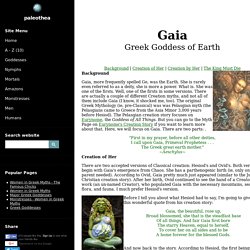
She is rarely even referred to as a deity, she is more a power. What is. "First in my prayer, before all other deities, I call upon Gaia, Primeval Prophetess . . . Creation of Her There are two accepted versions of Classical creation: Hesiod's and Ovid's. Before I tell you about what Hesiod had to say, I'm going to give you this wonderful quote from his creation story: Gaia, the beautiful, rose up, Broad blossomed, she that is the steadfast base Of all things.
And now back to the story. Creation by Her There aren't tons of stories about Gaia. There's a bunch of other mentions of her giving birth to people (especially men) - one of the most important was Erichthonius, who founded Athens. Gaia's Children Include: Uranus (yes I know he was her "husband" - but he was also her son - very Oedipal isn't it?...)
Don't know who your mama is? Gaia - Goddess Worship and Understanding Our World from a Feminine Perspective. "Of Gaia I sing . . .
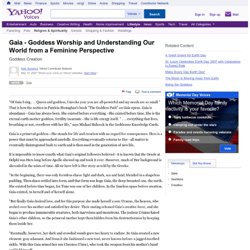
Queen and goddess, I invoke you: you are all-powerful and my needs are so small. " That is how the section in Patricia Monaghan's book "The Goddess Path" on Gaia opens. Gaia is abundance - Gaia has always been. She existed before everything - She existed before time. She is the eternal earth mother goddess, fertility incarnate - She is life energy itself. " . . . everything that lives, breathing or not, overflows with her life," says Michael Babcock in the Goddesses Knowledge Cards.
Gaia is a primeval goddess - She stands for life and creation with no regard for consequences. It is impossible to know exactly what Gaia's original followers believed - it is known that the Oracle at Delphi was Hers long before Apollo showed up and took it over. "In the beginning, there was only formless chaos: light and dark, sea and land, blended in a shapeless pudding. Gaia. Gaia or Gaea, known as Earth or Mother Earth (the Greek common noun for "land" is ge or ga ).
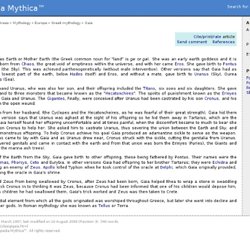
She was an early earth goddess and it is written that Gaia was born from Chaos , the great void of emptiness within the universe, and with her came Eros . She gave birth to Pontus (the Sea) and Uranus (the Sky). This was achieved parthenogenetically (without male intervention). Other versions say that Gaia had as siblings Tartarus (the lowest part of the earth, below Hades itself) and Eros, and without a mate, gave birth to Uranus (Sky), Ourea (Mountains) and Pontus (Sea).
Gaia - Gaia, the Goddess of the Earth - Fast Facts and Myths of Gaia. Gaia's Appearance: A beautiful and voluptuous woman.

Sometimes she is shown as half-buried in the earth. Symbol or Attributes of Gaia: The earth. Fruits. Gaia's Strengths: She is a primal mother goddess, complete in herself. Gaia's Weaknesses: She brought forth from her own body Uranus, to be her companion. GAEA : Greek goddess of earth ; mythology ; pictures : GAIA, TELLUS. GAIA (or Gaea) was the Protogenos (primeval divinity) of earth, one of the primal elements who first emerged at the dawn of creation, along with air, sea and sky.
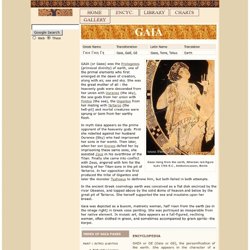
She was the great mother of all : the heavenly gods were descended from her union with Ouranos (the sky), the sea-gods from her union with Pontos (the sea), the Gigantes from her mating with Tartaros (the hell-pit) and mortal creatures were sprung or born from her earthy flesh. In myth Gaia appears as the prime opponent of the heavenly gods. First she rebelled against her husband Ouranos (Sky) who had imprisoned her sons in her womb. Then later, when her son Kronos defied her by imprisoning these same sons, she assisted Zeus in his overthrow of the Titan. Finally she came into conflict with Zeus, angered with him for the binding of her Titan-sons in the pit of Tartaros. Gaia was depicted as a buxom, matronly woman, half risen from the earth (as in the image right) in Greek vase painting.
Gaia (mythology) The Greek word γαῖα (transliterated as gaia) is a collateral form of γῆ[4] (gē, Doric γᾶ ga and probably δᾶ da)[5] meaning Earth,[6] a word of uncertain origin.[7] R.
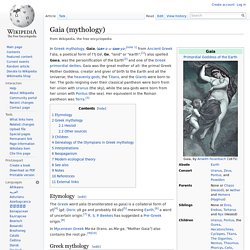
S. P. Beekes has suggested a Pre-Greek origin.[8] In Mycenean Greek Ma-ka (trans. as Ma-ga, "Mother Gaia") also contains the root ga-.[9][10] According to Hesiod, Gaia conceived further offspring with Uranus, first the giant one-eyed Cyclopes: Brontes ("Thunder"), Steropes ("Lightning") and Arges ("Bright");[16] then the Hecatonchires: Cottus, Briareos and Gyges, each with a hundred arms and fifty heads.[17] As each of the Cyclopes and Hecatonchires were born, Uranus hid them in a secret place within Gaia, causing her great pain. Because Cronus had learned from Gaia and Uranus, that he was destined to be overthrown by his own child, Cronus swallowed each of the children born to him by his Titan sister Rhea.
With Gaia's advice[21] Zeus defeated the Titans.